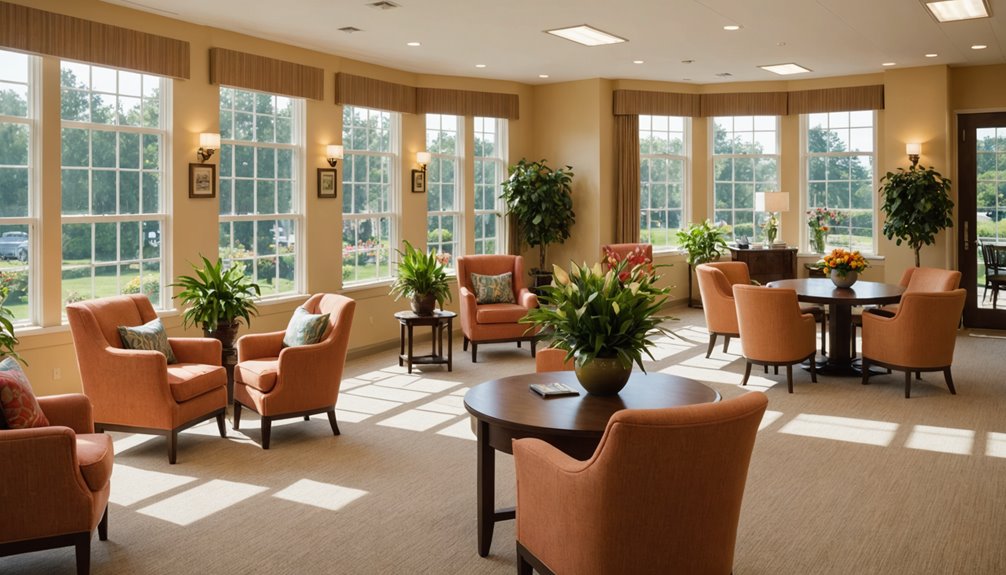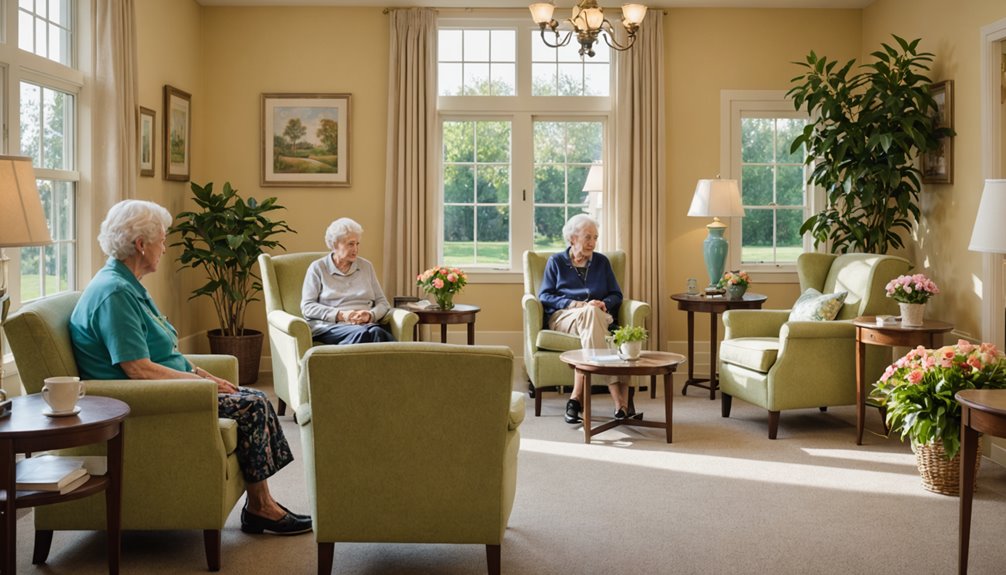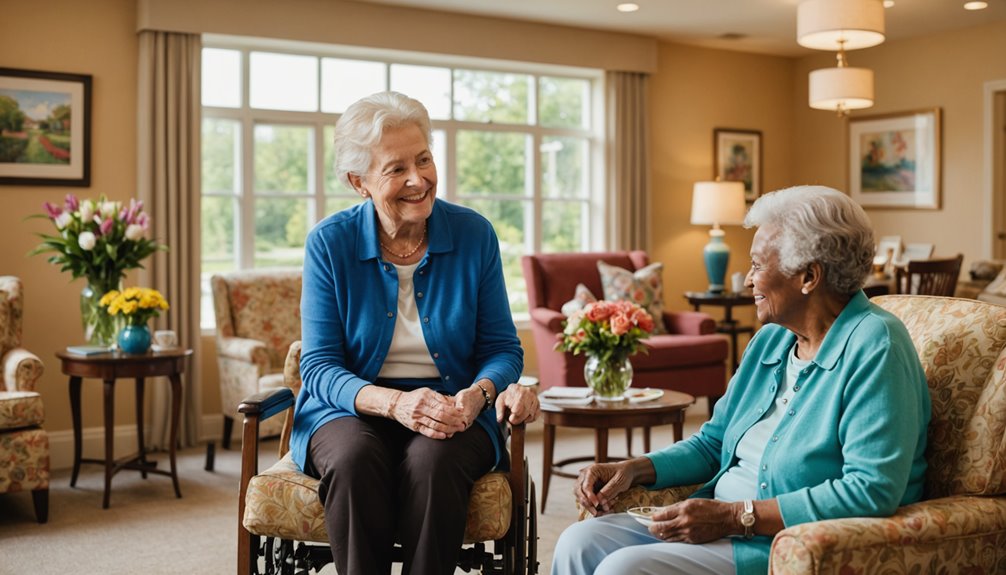Understanding Levels of Care in Assisted Living Communities

Understanding the levels of care in assisted living communities is crucial for you to find the right support for yourself or a loved one. Assisted living offers various services, including help with daily activities like bathing and medication management, all tailored to meet individual needs. Depending on requirements, you can also explore specialized programs like memory care for those with Alzheimer's. Communities often feature meal services, social activities, and transportation options to enhance quality of life. Assessing your specific needs and priorities will guide your decisions, leading to a nurturing environment that fits just right. You can uncover more insights to make informed choices.
Key Takeaways
- Assisted living provides personalized care plans to support daily activities, ensuring residents maintain their independence while receiving necessary assistance.
- Levels of care include help with bathing, dressing, grooming, and medication management, tailored to individual needs.
- Specialized programs, such as memory care, address unique challenges faced by individuals with Alzheimer's or dementia.
- Staff are available 24/7 for check-ins and hands-on assistance, promoting safety and comfort for residents.
- Community features like meal services, social activities, and transportation enhance overall well-being and engagement in assisted living environments.
Overview of Assisted Living

Assisted living communities provide a supportive environment for individuals who need assistance with daily activities but still want to maintain a level of independence. These communities offer a range of benefits designed to enhance your quality of life. You'll find personalized care plans that address your specific needs, ensuring you receive the right level of support.
Community features play a crucial role in fostering a sense of belonging and security. You can expect to enjoy various amenities, such as meal services, housekeeping, and social activities, all aimed at enriching your daily routine. These features not only promote a vibrant lifestyle but also encourage social interaction with peers, which can combat feelings of loneliness.
Furthermore, assisted living communities often provide safety measures, like 24-hour supervision and emergency response systems, giving you peace of mind. You'll also have access to transportation services for medical appointments and outings, allowing you to stay engaged in the community. For example, many communities focus on providing personalized care services tailored to individual needs.
In essence, assisted living bridges the gap between independence and necessary support, empowering you to live your life with dignity while receiving the help you need.
Independent Living Explained
For many individuals seeking a lifestyle that balances independence with minimal support, independent living offers an appealing option. This living arrangement is designed for seniors who value their autonomy and want to maintain control over their daily lives.
In independent living communities, you'll find a variety of lifestyle choices that cater to your preferences, promoting a sense of community while allowing you the freedom to come and go as you please.
These communities typically provide amenities such as meal services, housekeeping, and recreational activities, making it easier for you to enjoy life without the burdens of home maintenance. You can engage in social activities, pursue hobbies, and connect with neighbors who share similar interests, all while having the independence to manage your own schedule.
Independent living is ideal for those who are relatively self-sufficient but may benefit from the convenience of on-site services. It's about enhancing your quality of life while ensuring you have the support you need, should you ever require it. Additionally, many independent living communities also offer access to memory care services for residents who may need specialized support in the future.
Assisted Living Services

What do you need when daily tasks become a bit more challenging? In assisted living communities, you'll find a range of services designed to provide personalized care tailored to your unique needs. These services can help you maintain your independence while ensuring you receive support with daily activities.
From assistance with bathing, dressing, and grooming to medication management, the goal is to make your life easier and more enjoyable. Trained staff are available around the clock, ready to help you as needed, whether it's a quick check-in or more hands-on support.
You'll also have access to meal services, social activities, and wellness programs that encourage a balanced lifestyle. Moreover, many communities offer transportation services for outings and appointments, so you can stay engaged with the world around you.
By choosing assisted living, you're opting for a nurturing environment where you can thrive. You'll find that these services not only help manage daily routines but also promote social interaction and mental well-being, making every day a little brighter. Facilities, like Audubon Care Homes(https://auduboncarehomes.com), provide specialized care for residents with Alzheimer's and related dementia.
Embrace the support available to you, and discover how assisted living can enhance your quality of life.
Memory Care Options
Navigating the complexities of memory loss can be daunting, but memory care options in assisted living communities offer specialized support to help you or your loved one thrive.
These tailored programs focus on providing the memory support necessary for those facing challenges like Alzheimer's or other forms of dementia.
Memory care facilities are designed to create a safe, engaging environment. You'll find trained staff who understand the unique needs of residents, offering daily routines that promote cognitive enhancement.
Activities such as memory games, art therapy, and social interactions encourage mental stimulation and emotional well-being.
In addition to structured activities, memory care options often include personalized care plans. These plans take into account individual preferences and needs, ensuring that each resident receives the attention they deserve.
You can expect round-the-clock assistance, which fosters a sense of security and comfort for both you and your loved one. This constant care is provided by 24/7 trained staff, ensuring that residents' needs are met at any time.
Choosing a memory care option can feel overwhelming, but knowing there's a supportive community ready to assist can make all the difference.
With the right resources, you can help your loved one maintain dignity and happiness in their journey.
Skilled Nursing Facilities

While memory care options provide vital support for those with cognitive challenges, skilled nursing facilities offer another layer of comprehensive care for individuals with complex medical needs.
These facilities are designed to cater to seniors who require 24/7 medical supervision and assistance. If you or a loved one faces chronic illnesses, post-surgical recovery, or ongoing rehabilitation, skilled nursing can be the right choice.
In skilled nursing facilities, highly trained staff members ensure that residents receive not only medical attention but also rehabilitation services tailored to their specific needs.
Whether it's physical therapy to regain strength or occupational therapy to enhance daily living skills, these services play a crucial role in recovery and maintaining independence.
Moreover, skilled nursing facilities often provide a comfortable, home-like environment, allowing residents to socialize and engage in activities, which can greatly improve their quality of life.
With a focus on both medical care and emotional well-being, these facilities help bridge the gap between hospital care and independent living, ensuring that you or your loved one receives the support needed to thrive. Additionally, many skilled nursing facilities emphasize community engagement through various activities that promote social interaction among residents.
Choosing skilled nursing can be a significant step toward regaining health and maintaining dignity.
Respite Care Benefits
Taking a break can be essential for caregivers, and that's where respite care shines. This service provides temporary relief, allowing you to step away from your caregiving responsibilities without guilt. You deserve time to recharge, and respite care offers you that opportunity.
By utilizing respite care, you gain access to trained professionals who can step in and provide the same level of care your loved one receives at home. This not only ensures their well-being but also gives you peace of mind. Whether you need a few days or just a few hours, respite care can be tailored to your schedule.
Moreover, this type of care serves as a vital form of caregiver support. It helps prevent burnout, which can affect your health and the quality of care you provide. With the right support, you can return to your caregiving role feeling refreshed and more capable than before.
In essence, respite care isn't just a luxury; it's a necessary resource that promotes your well-being and the well-being of those you care for. Embrace this opportunity for temporary relief and invest in your own health while ensuring your loved one is in good hands.
Specialized Care Programs

Specialized care programs are essential for meeting the unique needs of individuals in assisted living communities. These programs focus on specific conditions, ensuring you or your loved one receives the right support and care. From memory care for those living with Alzheimer's or dementia to programs addressing mobility challenges, these specialized programs are designed to enhance quality of life.
You'll find that each program incorporates tailored therapies aimed at promoting independence and well-being. For instance, physical therapy can help improve strength and mobility, while occupational therapy may assist in daily living activities.
Furthermore, emotional support through counseling or group activities fosters social connections, which are vital for emotional health.
It's crucial to understand that specialized care isn't just about addressing medical needs; it also emphasizes holistic well-being. The staff are trained to recognize individual preferences and goals, enabling them to create personalized care plans.
Choosing the Right Level
Navigating the various levels of care in assisted living communities can feel overwhelming, especially when you want to ensure your loved one receives the best support possible. To choose the right level, start with personalized assessments that evaluate their specific needs and preferences. These assessments often consider medical history, daily living activities, and social engagement levels.
It's essential to involve your family in this process. Discuss your loved one's requirements and desires openly, as this collaboration can help you make informed decisions. Together, you can weigh the options available at different communities, ensuring that the chosen level of care aligns with both health needs and lifestyle preferences.
Look for communities that prioritize individualized care plans. These plans should be regularly reviewed and adjusted as needs change, allowing for flexibility over time.
Remember, it's about finding a balance between independence and necessary support. Don't hesitate to schedule tours and ask questions about how they handle care transitions.
Ultimately, your goal is to foster a supportive environment that promotes dignity and quality of life for your loved one.
Frequently Asked Questions
How Is the Cost of Assisted Living Determined?
The cost of assisted living is determined by a cost breakdown that includes services, amenities, and location. You can explore financial assistance options to help manage expenses and ensure you receive the care you need.
Can Residents Bring Their Own Furniture and Belongings?
Yes, you can usually bring your own furniture and belongings. Many communities offer furniture customization options, allowing you to create a comfortable space. However, check the personal belonging policies to ensure compliance with specific guidelines.
What Are the Visiting Policies for Family and Friends?
Visiting policies usually include set visiting hours to ensure residents' comfort. Family involvement's encouraged, so check specific times for visits. Regular visits can enhance your loved one's well-being and connection within the community.
Are Pets Allowed in Assisted Living Communities?
Many assisted living communities allow pets, but pet policies vary. These furry companions provide emotional benefits, reducing stress and loneliness. It's essential to check specific guidelines to ensure your pet can join you comfortably.
How Do I Handle Transportation Needs for Residents?
To handle transportation needs effectively, assess each resident's mobility and preferences. Explore transportation options like shuttles, rideshare services, or volunteer drivers. Regularly communicate with residents to ensure their needs are met and adjust plans as necessary.
Conclusion
Navigating the levels of care in assisted living can feel overwhelming, but you're not alone. Understanding your options—whether it's independent living, memory care, or respite care—helps you make the best choice for yourself or a loved one. Each community offers unique services tailored to individual needs, ensuring comfort and support. Take your time, ask questions, and trust your instincts. The right environment can make all the difference in enhancing quality of life and providing peace of mind.




